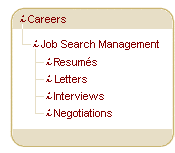When you are writing your resume, be sure to think about the following two goals:
- The reader will clearly understand your abilities.
- Your abilities match the needs of the job for which you are applying.
Consider the hiring process from the employer's point of view. They have hundreds of resumes to deal with on a daily basis. They have little time to answer their basic questions:
- Might the person represented by this resume match our needs?
- Should I pass this resume on to someone else in the company?
Your job is to write the resume such that both questions are answered, yes, if that is indeed the case. In other words, your job is to write the resume such that, if the answer should be yes to both questions, the reader of the resume will be able to give these answers correctly and quickly.
There is a Time and a Place for Being Humble
Your resume is not the place to be humble. Pretend you are writing for someone close to you, someone who is proud of you, a person who would not think twice about bragging about you. They have the right idea: use it and be bold.
A Top-Level Check List
|
content
|
Put your name at the top, preferably in slightly larger and bold letters.
Only include entries that highlight a capability or an accomplishment.
Use consistent capitalization and punctuation.
Keep repeated words to a minimum.
|
|
organization
|
Put your best assets first: education, experience, or skills.
Make it easy to skim: use clear categories and indent the text.
Make the dates of employment easy to find and consistently formatted.
Put your name at the top of each page.
|
|
design
|
Minimize the number of fonts you use.
Use margins and line spacing to keep the page from looking too crowded.
Present the resume on one side of the sheet only, preferably on high-quality paper.
|
Send the Resume by Itself?
No! Whenever you get the chance, send the resume with a cover letter. Use the cover letter to:
- show your interest in the company or position
- summarize the most important aspects of your background
- tell the employer where and when you can be contacted for an interview

 Careers
Careers



